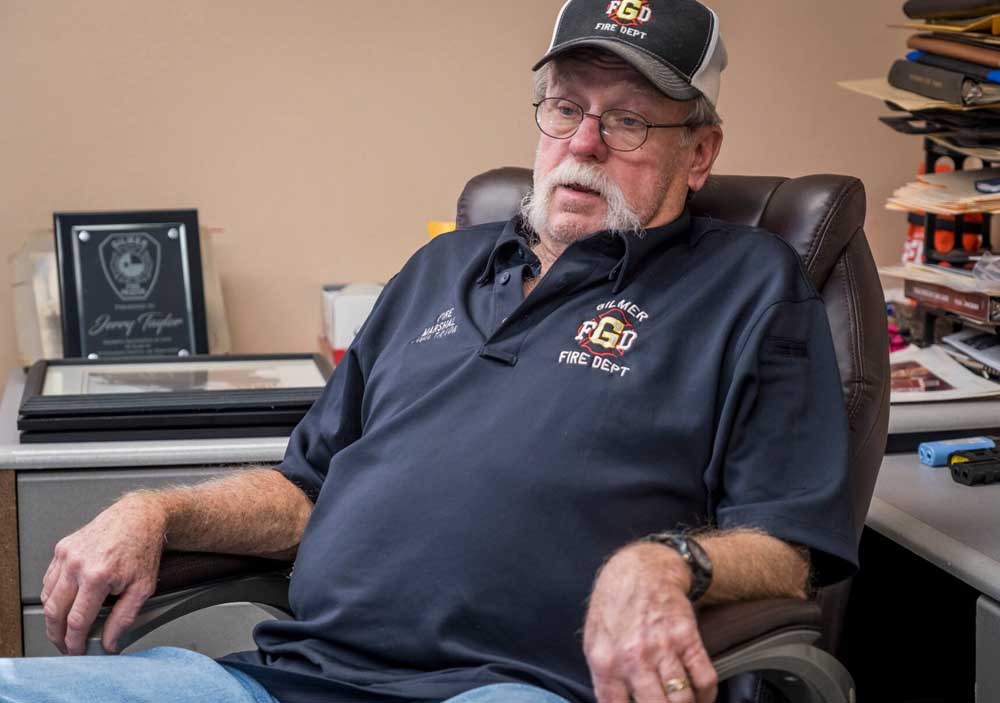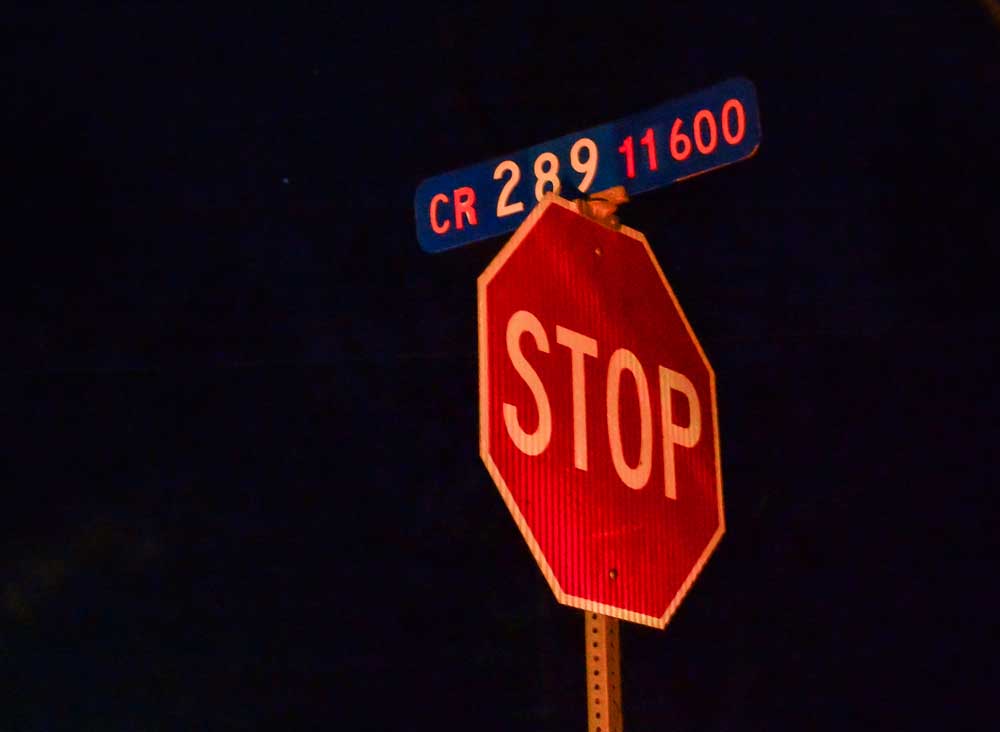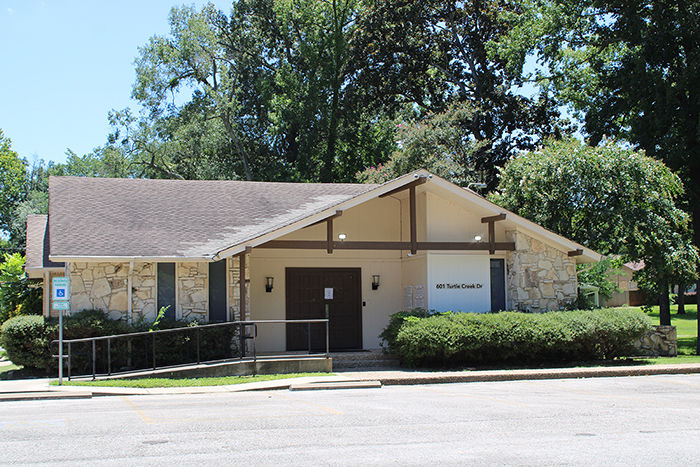‘It gets in your blood:’ For 150 years, Taylor family has served Gilmer as firefighters
Published 5:45 am Saturday, December 28, 2024

- Gilmer Fire Marshal John Taylor talks about his career in firefighting during an interview Dec. 11 at the Gilmer Fire Department. (Les Hassell/Longview News-Journal Photo)
Editor’s note: This story is the first in a series called “Answering the Call” about East Texas volunteer firefighters who’ve served their departments for at least 40 years.
GILMER — Fire billowed out the front door of the little country shanty as members of the Gilmer Volunteer Fire Department arrived on the scene. For the first time, Johnny Taylor would get to feel the heat.
Trending
He was 15 or 16 and suited up in his firefighter’s helmet and coat. One of the department’s veteran firefighters, Henry Fink, shoved him in the front door for his first fight with the flames.
When he emerged from the fire, Taylor asked Fink: “Mr. Henry, why did you shove me in there?”
As Taylor recounted the story on a recent December day, he turned to his brother, Jerry, and said: “I’m sure it’s the same thing he probably told you and a bunch of others: ‘The next time you go to a fire, you’re going to run. I just want to make sure you run to it instead of from it.’”
In the decades since then, Fink’s words have been written on Jerry and Johnny Taylors’ hearts. In May, Jerry, 65, started his 50th year of service with the Gilmer Fire Department. Johnny, 66, will begin his 53rd year in January. Their father, Jack, who died in 1990 at age 72, served almost as long as they did, meaning the Taylor family has served about 150 years combined at the same department.
The Taylors have experienced regret, tragedy and pain. But if they could do it all over again, they say they would. They attribute their inextinguishable love for firefighting to blood — blood that runs as red in their veins as the fire engines they race down the highway to save the day.
“Once it gets in your blood,” Jerry said, “there’s nothing you can do.”
Trending
‘All I’ve ever done’Two years ago, Johnny nearly died after fighting two grassfires. The grass was “burning like hell,” and as he fought the blaze, he learned the hard way that he couldn’t handle the smoke anymore. He ended up in the emergency room to take breathing treatments.
Tears welled in his eyes as he told the story on a recent December day while sitting in his brother’s office at the fire department. He lost the ability to do something he dearly loves. He’ll never again fight a fire “unless it’s life or death and I’m the only one.”
But now, he has a new objective: help young firefighters become old firefighters. With his experience as an instructor, he can teach them how to stay safe — and how to fight fires in a way that textbooks can’t.
“We’re gonna keep having fires, so there are gonna have to be firefighters,” he said.
From an early age, danger seemed to be destiny for the Taylor brothers. They were about 10 or 12 years old when they started responding to fires with their father and driving firetrucks during grass fires. When they turned 15, their father signed a waiver allowing them to join the department officially.
“When you’re a kid, you either want to be a policeman or a fireman, and I wanted to be a fireman, and I never changed,” Jerry said. “That’s all I’ve ever done.”
Jerry worked as a firefighter at Lone Star Steel before embarking on a 25-year career with the Longview Fire Department, retiring in 2012. He remained with the Gilmer department the whole time, and he became its chief after his retirement.
Johnny also worked at Lone Star as a firefighter for two summers, and he wanted to be an electrician like his father. He worked in Longview as an electrician and then went to work for Eastman Chemical Co. in 1993, where he joined the emergency response team. He became Gilmer’s fire marshal in 2002 — another job his dad had. All the while, he, too, remained a volunteer in Gilmer.
Jack Taylor remained active in the department until about two years before his death. The department still has a 1940 Ford fire engine that was purchased new when he was with the department. It was hauled to Gilmer via train, and he unloaded it off the railcar. It’s not in active fire service anymore, but the brothers drive the engine for parades and other occasions.
“Our dad had a — I guess you would call it a heavy foot,” Johnny said “We have been riding with daddy, following that old truck years ago in excess of 100 miles per hour.”
‘Get there, and get it done’Jerry still remembers a lesson a fire department captain taught him on his first day on the job with the Longview Fire Department. The captain walked him out the back door of the station and pointed to a house.
“It wasn’t the nicest neighborhood,” Jerry said. “And he said, ‘See that house right there?’ And I said, ‘Yes, sir.’ He said, ‘That house is just as important to those people as that million dollar house on the north side of Longview. If you’re going to work out here with me, you’re going to take care of that property.’”
“Those people probably cherish their stuff more than the million dollar people,” Johnny added. “That’s the very best they can do.”
It’s that kind of care for people, their homes and their lives that the Taylors have carried with them for decades. They know that, when people call the fire department, they’re not having a good day.
Those bad days take a heavy toll on firefighters, too. Year after year, they witness deaths, explosions and countless other tragedies — all memories they wish they could forget. Sometimes, even after giving it all they’ve got on a call, firefighters still aren’t able to bring about the end they wanted. They wonder: What could they have done differently?
“Daddy always told us: ‘It’s your job. You’re the one that’s got to do it. Just do it. You can get sick tomorrow. You can think about it tomorrow. It’s your job. Get there, and get it done,’” Johnny said.
Painful experiences can cause a firefighter to end his career, the Taylors said. If a man lets the bad memories torment him, he won’t stay in the field.
Unlike a fire, suppressing memories and emotions isn’t healthy. And just like a fire, a man can’t fight his mental, emotional and spiritual battles alone.
“Faith in the Lord always gets you there — faith, family and friends,” Jerry said. “They’ll get you through every bit of it. And if it bothers somebody, if they will just talk about it, then there’s usually somebody that has seen it or been involved with the same thing, and they can guide you through it.”
Service above selfWhen the Taylors began their volunteer firefighting careers, more men were willing and able to do the same.
“Everybody that was important was a fireman: city council members, mayors, business owners, doctors, lawyers, police chiefs — they gave their time and did,” Jerry said.
It was a family affair, too. A number of fathers and sons served together.
That kind of selfless service seems elusive these days. Once upon a time, the Gilmer department had so many aspiring volunteers that they were on a waiting list. Now, the department has about 23 members on its roster.
The brothers are concerned about the future of volunteer firefighting, which has been in decline nationwide for years. In 2020, the National Fire Protection Association reported that the nation had about 676,900 volunteer firefighters — down from 897,750 in 1984. Volunteers make up about 65% of the nation’s firefighting force, according to the National Volunteer Fire Council.
“Nobody wants to volunteer. Nobody has time,” Johnny said. “And this may sound cold and cruel, but I firmly believe it: People nowadays do not care for the fellow man like they used to. They could care less.”
The work isn’t for the faint of heart. Volunteer firefighters can be called out day or night, in rain, snow and sleet, in the cool of winter or the dead of summer. They’re not paid. And there’s no guarantee they’ll make it out alive.
“Anytime that pager goes off, we know it could be our last one,” Johnny said. “I guess it’s in your heart, in your mind. It’s just a sacrifice that, deep down, you know you’re willing to make if you have to, to try to help somebody. We never think about it, but yet we would if we had to.”
Despite the risk, those who join a fire department will find a brotherhood unlike any they’ve ever known, the Taylors say. So, too, they’ll find equality.
“If you can go get a ladder or get an axe or get a pike pole or bring a fan or a saw to the front door, that’s just as important as having an air pack on with a hose in your hand,” Johnny said.
There’s something good in store for those who serve, too.
“Anytime you can help people is rewarding,” Johnny said.
The Taylors still thoroughly enjoy what they do — so much so that they’re willing to train the next generation to do the same, they say.
“We’ll get you lined out and going, and we’ll push you in the front door,” Jerry said — metaphorically, of course.
“Well, you can’t do that anymore,” Johnny said with a laugh.
“We’ll give ‘em a little training — enough training to do it,” Jerry said. “Then we’ll push ‘em in the door.”
Nominate a
firefighter
Do you know of a volunteer firefighter in East Texas who has served for 40 years or more?
If so, email the firefighter’s name, some biographical information and contact information to jgreen@news-journal.com.






